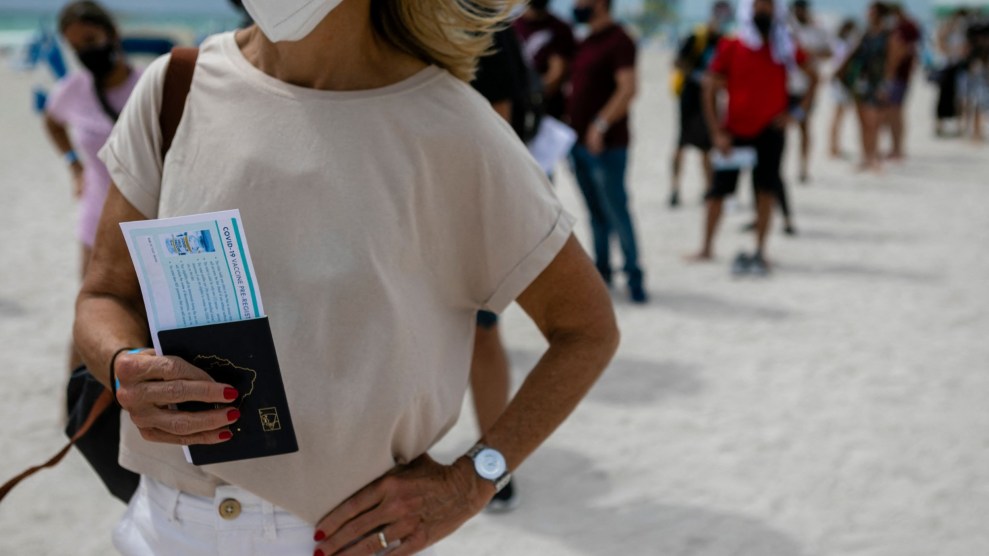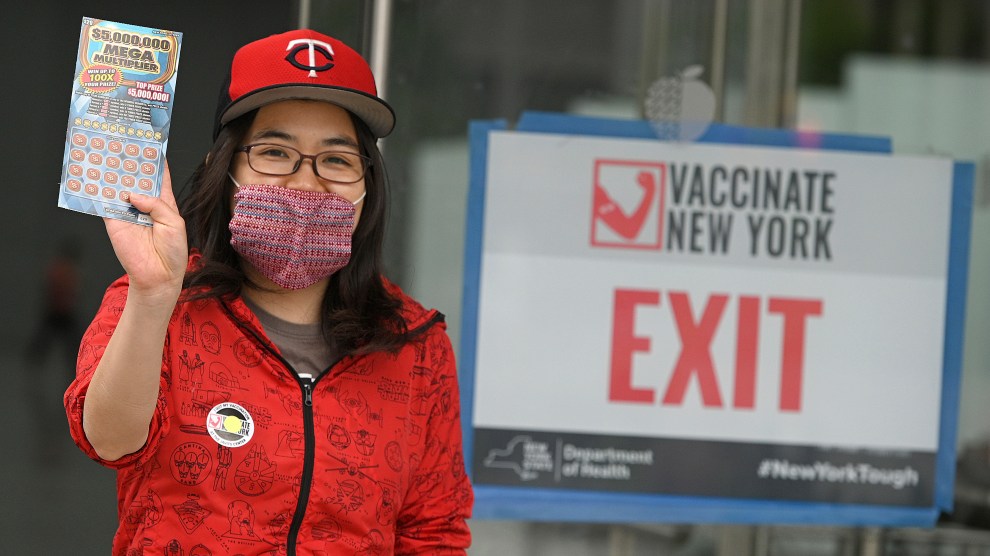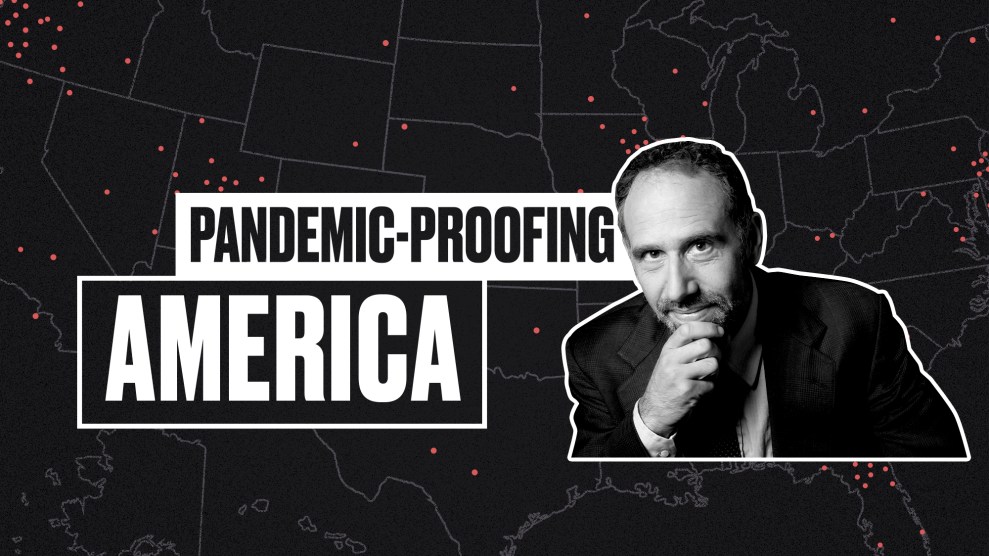
Woman holds her passport in line to get a Covid-19 vaccine at a pop-up vaccination center in Florida.Eva Marie/AFP/Getty
I’m 29 years old, live in Rio de Janeiro, and have been stuck in Brazil for more than a year as a result of travel restrictions and visa processing delays. According to a Brazilian website that estimates when you’re likely to get vaccinated based on age and the average vaccination rate for your state of residency, I can expect to receive my first dose of a COVID-19 vaccine in one year, seven months, and ten days. That prospect seems a little too pessimistic, even for Brazil, where the pandemic continues to surge and the death toll has surpassed 460,000. The alternative best-case scenario is slightly more reassuring. Provided that nothing dramatically changes for better or worse, based on the official calendar released by Rio’s secretary of health, September 13 looks like it will be my lucky day.
As of late May, the first-dose vaccination rate in Brazil stands at 20 percent—about 44 million people—with only 10 percent of the population having been fully vaccinated. In Rio, the schedule has been organized according to age and gender, with preferences given to the elderly and healthcare workers. That age-based calendar was interrupted in mid-May to accommodate people with medical conditions and other priority groups. For the whole month of June, adults between the ages of 59 and 51 will be prioritized—with alternating days for men and women—followed by those in their 40s in July, and so on. (Therefore my estimated September date.) That, of course, is in dramatic contrast to the United States, where half the population (including 61 percent of adults) has received at least their first shot, and 40 percent are fully vaccinated, according to the Centers for Disease Control and Prevention data tracker.
But unvaccinated Brazilians are pursuing another option: they are traveling abroad, in some cases quite literally across the globe, to get their jab. That is, obviously, only an option for a very privileged few.
COVID-19 vaccine tourism for the wealthy who happen to live in places with less access to vaccines, like Brazil, Argentina, and Taiwan, is a real thing, and yet another reminder of the deep-seated inequalities the pandemic has further exposed and exacerbated. Americans are being incentivized with perks like free beers and monetary rewards upwards to $1 million to get vaccinated. Some major US cities are promoting access to immunization as a way of attracting tourists. Meanwhile, those in the Global South who can afford it are sometimes spending hundreds of thousands of dollars on flights and accommodation in the pursuit of vaccines that are otherwise free, but not immediately accessible. Across Brazil, travel agencies eager to revive their stricken businesses are selling “get vaccinated in the United States” packages that cater primarily to the very well-off. Deals can range anywhere from a few thousand dollars covering only plane tickets to Mexico and then the United States, to $50,000 or more for exclusive itineraries.
The superrich who can’t get vaccinated back home are going on vacation, but not without some occasionally tricky logistics. US travel restrictions put in place in May of last year currently prevent most travelers—with the exception of citizens, permanent residents, and some professional categories—from entering the United States if they’ve been in Brazil in the previous 14 days. With the US embassy and consulates in Brazil remaining closed, many people who do have a valid US visa choose to quarantine in Mexico or other countries that are not subject to bans before heading to their final destination. The logistics are made all the more complicated and expensive by the vaccination arrangements. Without the guarantee of access to the single-shot Johnson & Johnson vaccine once on US soil, travelers have to take into account the interval of 21 to 28 days between the first and second dose of the Pfizer or Moderna vaccines.
That is why agencies like the São Paulo-based high-end boutique travel agency Be Happy Viagens offers customers 40-day trips. The company’s flagship products are tailor-made wedding, honeymoon, and even elopement packages with a focus on “exotic destinations,” says owner Jacque Dallal. “We understand travel as an investment in transforming people’s lives. What sets us apart is that we take care of travelers.” But in May, after New York mayor Bill de Blasio announced plans to vaccinate “tourists who are coming back in droves” at mobile vaccination sites set up throughout the city, the agency saw a boom in requests for (paid) consultations for vaccine tourism in the Big Apple, Miami, and Orlando. “The United States has vaccines in every corner,” Dallal says. “The word here is accessibility.”
The agency’s cheapest itinerary costs about $10,000 to fly economy class and stay in non-luxury hotels. Customers who would prefer to avoid Mexico instead can quarantine for two weeks in Panama or the Dominican Republic. And because there are so few countries where Brazilians are allowed to enter without considerable restrictions, the United Arab Emirates and the Maldives have also become somewhat inconvenient—if not illogical—options. In these cases, a couple should expect to invest at least $50,000, but “the sky is the limit,” says Dallal, who plans to start selling “quarantine” trips to the Caribbean island of Curacao in July. She has closed at least twenty deals thus far, including one for a family of seven who chose to fly to Dubai to quarantine before going to the United States. Some clients go into full-on vacation mode, while others, whom she refers to as the “frightened ones,” don’t leave the hotel for the duration of the trip and have a concierge deliver food to their door.
This kind of cost-prohibitive tourism amid a global pandemic that has taken the lives of at least 3.5 million people is but one facet of what World Health Organization Director-General Tedros Adhanom Ghebreyesus has described as a “vaccine apartheid” and a “catastrophic moral failure” in COVID-19 vaccine access. High-income nations, which account for 15 percent of the world population and have administered almost half of all vaccines, were ahead of the pack by pre-ordering doses from several vaccines in development, leaving other countries to scramble for purchase agreements. The United States, for instance, acquired enough doses to vaccinate three times its adult population, while in places like Guatemala less than 0.5 percent of the population is fully protected. Across Latin America and Asia, countries with lower vaccination rates are seeing new coronavirus variants emerge and spread. Brazil, which could have been one of the first nations to kickstart COVID-19 vaccination efforts were it not for President Jair Bolsonaro’s refusal of early deals and the lack of active ingredients hindering vaccine rollout, is anticipating a third wave.
“There’s nothing illegal about a family using their financial assets to get vaccinated abroad,” Dallal says. “It’s not a transgression. People are seeking to relieve their anxieties and pains in a legitimate way.”
And they are lining up to do so. According to Kayak, a popular travel booking website, searches for flights to New York City from Brazil spiked by 719 percent between April and May of this year. Miami, Los Angeles, and Orlando also saw big increases in demand, even though the exchange rate is $1 dollar to $5.2 Brazilian reais, in comparison to about $1 to R$4 two years ago. Several US states don’t require proof of residency to vaccinate. Florida, for instance, recently eliminated that stipulation after cracking down on vaccine tourism in January when demand still exceeded supply.
Flapper, a company that pitches itself as “Brazil’s first executive aviation marketplace” born out of a “need for accessible on-demand” private flying services, describes the vaccine tourism section on its website as “a new motivation for traveling in pandemic times.” For $115,000 (more than 500 times the minimum wage in Brazil), one can charter a 7-hour flight on a 12-person jet with striped leather seats from São Paulo to Punta Cana in the Dominican Republic. A direct flight to the Turks and Caicos that takes about as long is available for $98,000. The company also makes available two-leg routes departing from Colombia to Florida and cheaper options on empty-leg flights—when the aircraft needs to return to its initial base with or without passengers—where a single seat goes for a little over $5,000. The company’s CEO Paul Malicki says Flapper has sold 10 large flights in the last few weeks, both for customers with dual European or US citizenship, and those who are merely doing “medical tourism.” The most typical scenario is for travelers to enjoy a two-week holiday in Cancun, he says, before heading to Europe or the United States to get vaccinated.
Tourism agencies make a point of emphasizing that scheduling vaccine appointments is the traveler’s sole responsibility and vaccination is not guaranteed. “Some people come to us with the idea that we are giving away vaccines,” says Albino Ferreira Neto, who runs a popular agency called Doutor Viagem (Travel Doctor) in the northeastern city of Recife. “We offer a way for them to arrive in the US but we’re not promising anyone immunization.” The majority of potential clients are those under the age of 40 for whom the timeline to get fully vaccinated is still far into the future. Since publishing the first ad on May 9 about vaccine opportunities abroad, they started receiving around 120 calls a day from in and out of the state, and the sales conversion rate increased fivefold. “We had to be on call 24/7 to meet the demand,” Ferreira Neto says. Still, he acknowledges, “it’s not for everyone.”
The International Monetary Fund recently proposed a $50 billion plan to vaccinate 40 percent of every country’s population by the end of 2021 and 60 percent by the first half of 2022. That would require affluent countries to step up and immediately donate surplus vaccines. A recent study by UNICEF found the world’s richest nations could donate 153 million doses to the global vaccine equity initiative COVAX Facility if they shared only 20 percent of their surplus supply between June and August— and this would not make a dent in the vaccination of their own populations. That effort is falling short by over 100 million in meeting its intended goal of delivering 170 million doses to low and middle-income countries. One reason for the shortfall is because of internal demand from India—an important producer—but also because of lack of funding and vaccine nationalism. “Sharing immediately available excess doses is a minimum, essential and emergency stop-gap measure, and it is needed right now,” UNICEF’s executive director Henrietta Fore said in a statement calling for well-supplied nations to “pool excess supply and share the burden of responsibility.” The alternative is a “two-track pandemic,” where richer countries and the wealthy in poorer countries move on, while the rest of the world is left behind.
Ethel Maciel, an epidemiologist from the Brazilian state of Espírito Santo with experience in infectious disease sees the issue of vaccine tourism as an ethical problem. “It’s every man for himself,” she says. “But it doesn’t do any good for people to get vaccinated and go back to a country where the pandemic is out of control. A variant can arise in these countries and put even the vaccination progress at risk.” The same wealthy businessmen and influential people who are doing vaccine tourism, she says, could be exercising pressure over public officials to step up negotiations with other countries and organizations.
“We should be fighting to get out of this situation together, not to have individual protection,” she continues. “It’s not enough to control the disease in one family, one state, or one country. We’re not getting out of this pandemic until it is over for everyone.”
















